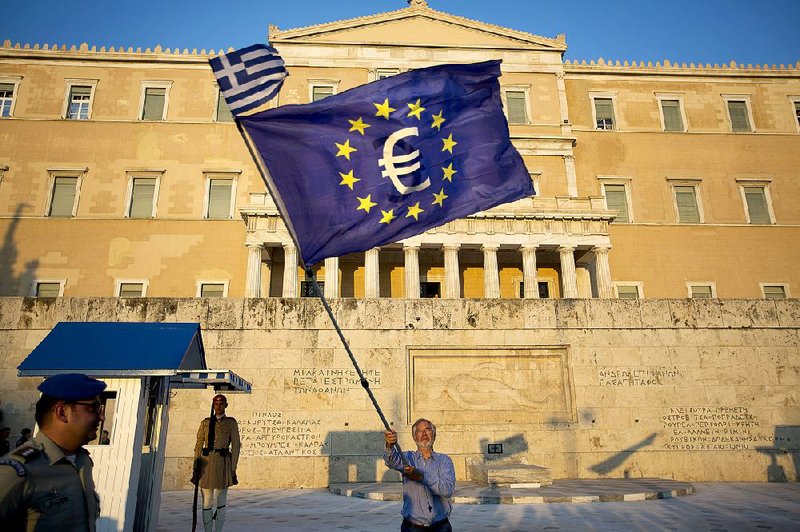ATHENS, Greece -- The government of Greek Prime Minister Alexis Tsipras submitted a new proposal Thursday that it hopes will persuade creditors to let the country stay in the euro.
The package of economic policy changes and spending cuts, put together with help from France, was approved by a majority of Greece's Cabinet ministers. It was sent to creditors late Thursday and will be presented to the Greek Parliament today.
Tsipras' government sought a three-year bailout loan of at least $59.2 billion. In exchange, it offered a package of fiscal changes, including tax increases and savings on pensions, similar to the one presented by creditors last month.
After months of foot-dragging despite an impending financial collapse, Tsipras met a midnight deadline Thursday with more than an hour to spare.
A spokesman for eurogroup President Jeroen Dijsselbloem said on Twitter that it was "important for institutions to consider these [proposals] in their assessment" of the Greek situation.
Finance officials from the European institutions and the International Monetary Fund were to carefully examine the proposals today before the 19 eurozone finance ministers assess them on Saturday.
The proposals then will be discussed at a summit of European Union leaders Sunday to determine whether Greece will get a new bailout or be forced to leave the euro currency.
As creditors received the Greek proposals, EU President Donald Tusk indicated that European officials would make an effort to address Greece's key request for debt relief as the country tries to rebound from a crisis that has erased a quarter of its economy.
"A realistic proposal from Greece will have to be matched by an equally realistic proposal on debt sustainability from the creditors," Tusk said Thursday in Luxembourg. "Only then will we have a win-win situation."
The U.S. also wants to see debt sustainability in Greece, State Department spokesman John Kirby said Thursday.
Making Greece's debt more sustainable likely would involve lowering the interest rates and extending the repayment dates on its bailout loans. Germany and many other European countries have argued against an outright debt cut, arguing it would be illegal under European treaties.
But Greece has long argued that its debt is too high to be paid back and said the country requires some form of debt relief. The International Monetary Fund agrees with the premise.
On Thursday, German Finance Minister Wolfgang Schaeuble said the possibility of some kind of debt relief would be discussed over coming days, though he cautioned it may not provide much help.
"The room for maneuver through debt re-profiling or restructuring is very small," he said.
Greek voters last weekend emphatically rejected new austerity measures proposed by its creditors in a referendum called by Tsipras, who hoped the vote would spur his European creditors to offer the country better terms.
He seeks a write-down of the country's outstanding debts, which exceed 170 percent of gross domestic product.
The European Commission's vice president for the euro, Valdis Dombrovskis, said member states are open to considering debt relief for Greece. Principal write-downs, though, could be difficult to get past conservative figures including Schaeuble.
Dombrovskis said Thursday that he was less optimistic than the French about "re-profiling," which is generally understood as giving debtors more time to pay off loans, as a solution for Greece.
France, which -- unlike Germany -- has been a sympathetic ally to Greece, provided technical assistance in the pulling together of the Greek proposals for a rescue deal.
"We think debt relief of some form will be on the table" but structured in a fashion capable of winning German backing, Royal Bank of Scotland analyst Michael Michaelides said in a research report.
Market reaction suggested investors believe that a bailout deal for Greece can be reached or that the European Central Bank can successfully contain the fallout if one isn't. The benchmark Stoxx Europe 600 Index rose 2.2 percent, and Greek, Portuguese and Italian bonds rose. The euro slid 0.4 percent to $1.103.
Even if Tsipras and creditors can reach a basic agreement, his greatest challenge may still lie at home.
European leaders are likely to insist that the measures to appease creditors be passed into binding legislation by the Greek Parliament, where lawmakers from Tsipras's ruling Coalition of the Radical Left, or Syriza, might vote against them.
A half-day meeting of Syriza lawmakers has been convened for this morning in which the premier is expected to discuss the proposals to creditors.
The party was elected in January after it promised to fight the successive spending cuts and tax increases that had been required for previous bailouts.
"Greece is obviously working to secure an immediate deal, but it must be a deal that opens a window out of the current crisis," Energy Minister Panagiotis Lafazanis, a hard-line Syriza member, said at a conference in Athens on Thursday. "We don't want a third memorandum with tough austerity measures."
In the meantime, Greece's financial system teeters on the brink of collapse.
In an interview with an Italian newspaper, European Central Bank President Mario Draghi characterized the situation as "really difficult," and Ardo Hansson, a member of the bank's governing council, said Greece's situation was "quickly and sharply deteriorating."
Greece has imposed restrictions on banking transactions since June 29, limiting cash withdrawals to less than $70 per day to stanch a bank run. Banks and the country's stock market have been shut for just as long.
The closures, which have been extended through Monday, have led to daily lines at ATMs and have hammered businesses. Sending money abroad has been banned without special permission.
"Can you see anybody in the shop? Nobody's coming in because everyone's living off a drip," said Magda Petridi, a fortuneteller who runs a shop selling good-luck charms, aromatic oils and trinkets. "Until a month ago business was going pretty well."
Pensioners without bank cards have been hit particularly hard as they have struggled to access their accounts. Some bank branches have been opened so the elderly and the unemployed who lack bank cards can withdraw a maximum weekly sum of about $130.
Hundreds lined up outside banks Thursday morning, many facing hours-long waits in the heat.
If Tsipras does not get a deal, Greece faces an almost inevitable collapse of the banking system, which would be the first step for the country to fall out of the euro.
"I believe he will have to get an agreement," said mechanic Pantelis Niarchos, walking down the street in central Athens. "We will pay dearly for it, but at least we'll get an agreement."
Information for this article was contributed by Nikos Chrysoloras, Matthew Campbell, Rebecca Christie, Ian Wishart, Corina Ruhe, Karl Stagno Navarra, Marine Strauss, Jonathan Stearns, James G. Neuger, Arne Delfs, Eleni Chrepa, Marcus Bensasson, Paul Tugwell, Constantine Courcoulas, Eshe Nelson and Stephanie Bodoni of Bloomberg News and by Derek Gatopoulos, Raf Casert, Efty Katasreas, Angela Charlton, David McHugh and Mike Corder of The Associated Press.
A Section on 07/10/2015

